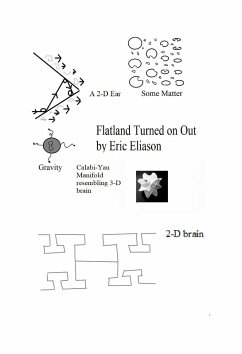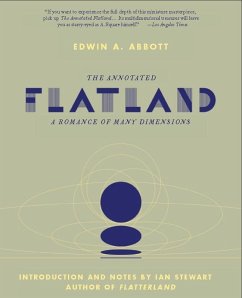
Flatland (eBook, ePUB)
A Romance of Many Dimensions

PAYBACK Punkte
0 °P sammeln!
"Flatland: A Romance of Many Dimensions" is a satirical novella set in a two-dimensional world inhabited by geometric figures. Abbott employs a distinctive literary style that melds social commentary with mathematical concepts, reflecting the Victorian context that influenced his work. Through the protagonist, A Square, Abbott explores themes of hierarchy, class distinctions, and the limitations of perspective, urging readers to question their preconceived notions about dimensions and reality. His clever narrative reveals the absurdities of a society bound by rigid social structures, ultimatel...
"Flatland: A Romance of Many Dimensions" is a satirical novella set in a two-dimensional world inhabited by geometric figures. Abbott employs a distinctive literary style that melds social commentary with mathematical concepts, reflecting the Victorian context that influenced his work. Through the protagonist, A Square, Abbott explores themes of hierarchy, class distinctions, and the limitations of perspective, urging readers to question their preconceived notions about dimensions and reality. His clever narrative reveals the absurdities of a society bound by rigid social structures, ultimately challenging the reader to envision broader dimensions beyond their own understanding. Edwin Abbott Abbott (1838-1926) was an English schoolmaster, theologian, and writer, whose diverse intellectual pursuits shaped his literary endeavors. As a man deeply interested in education and social reform, Abbott aimed to illuminate the constricting nature of societal norms and prejudices. His awareness of educational inequalities and his passion for mathematics directly informed the construction of Flatland, creating a bridge between the realms of geometry and human experience, effectively illustrating the limitations of human perception. I highly recommend "Flatland" to readers and scholars alike, as it remains a pivotal work that stimulates critical thinking about the nature of reality and perception. Its unique blend of humor, philosophical inquiry, and mathematical rigor makes it a must-read for those intrigued by the interplay between science and society, as well as those seeking a profound yet accessible exploration of dimensionality.
Dieser Download kann aus rechtlichen Gründen nur mit Rechnungsadresse in A, B, BG, CY, CZ, D, DK, EW, E, FIN, F, GR, H, IRL, I, LT, L, LR, M, NL, PL, P, R, S, SLO, SK ausgeliefert werden.













